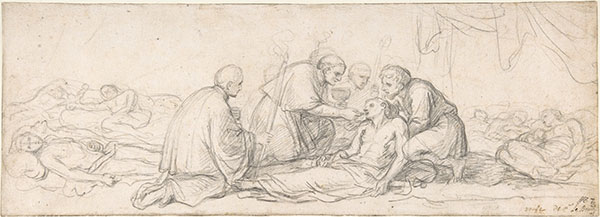
St. Charles Borromeo Giving Communion to the Plague-Stricken, Charles Le Brun, 17th century, public domain.
In the fourteenth century Europe was struck by the bubonic plague, the deadliest disease outbreak in history. During this time, there emerged a group of Christians called the Flagellants. They would publicly whip themselves and inflict brutal lashings upon their bodies. People in the Middle Ages knew nothing about viruses or how infections worked, so a common religious explanation was that sickness showed God’s wrath toward some sort of misbehavior. The Flagellants believed that if they punished themselves severely enough, then they would win God’s approval, and his punishment would be withdrawn. This belief was rooted in an ancient and primitive spirituality, in which people believed that God or the gods would be angry if they were not satisfied, and must be appeased through endless cycles of sacrifice.
This idea is so deeply embedded in the human psyche that it still shows itself today. In the Western Christian world, God has often been seen as a punishing deity that is easily angered and swiftly hands out discipline. Not remedial discipline to change the behavior of people, but vindictive, punitive judgment that only serves the desire for revenge. This vision of God usually twists people into self-deprecating, guilt-laden zombies with a mindset not that different from the Flagellants. Many religious people today seem to constantly hold themselves in contempt, perpetually highlighting their shortcomings, and denigrating themselves to no end. It is a blatant dishonesty to call such a god “good.” Instead, this is how a slave responds to a cruel master or a child to an abusive parent.
Oddly enough, several centuries earlier in history, Christians were in a strikingly similar situation, but responded in a completely different way. Around 250 CE, an epidemic broke out (likely smallpox) which spread throughout the Roman Empire. This outbreak continued for at least twenty years and at its fiercest points as many as five thousand people died every day. It was later called “The Cyprian Plague.”
As bodies piled up in the streets and masses of uncared for sick were dying, the Roman authorities did nothing but superstitiously offer sacrifices to their gods, hoping that this would compensate for whatever had irritated their capricious deities. But what the followers of Jesus chose to do was shocking. Rather than isolate themselves, they went out and started giving proper burials to those who had died. They also began caring for the sick and allowing those who were dying to at least do so with dignity. These Jesus followers gave help not only to their own, but to their pagan contemporaries as well. Many considered them reckless for exposing themselves to the (at the time) unknown illness, and indeed, many of them did contract the sickness and died. Despite this, many people saw this indiscriminate compassion from the outside and became followers of Jesus themselves.
The difference between these two types Christians is striking. The Flagellants gave allegiance to an angry god who was satisfied by suffering and people degrading themselves. Their god was nothing more than a projection of unhealthy self-loathing. This belief resulted in these Christians offering absolutely nothing to the world around them.
Alternatively, the Christians who lived during the Cyprian Plague embraced the reality that they were so deeply loved by God that they could give themselves away without needing anything in return. They were caught up in a love so great that it lifted them above their need for survival. These Christians were able to break themselves open and pour themselves out for the healing of the world, just as Jesus had done before them.
The God encountered in Jesus is not a solution to a metaphysical conundrum, nor an answer to epistemic riddle, nor a supernatural parent in the sky. This God is a mystery that is experienced in the act of love itself. When we seek out love, truth, beauty, compassion, justice, or anything that enriches the life of another, God will meet us there. Indeed, the message of Jesus is that God has been waiting there all along, and that is Good News.
About Zach Christensen
Zach Christensen lives in Fremont, Nebraska with his lovely wife. He has just recently received his Master of Arts in Theological and Biblical Studies, and is a full time social services worker.